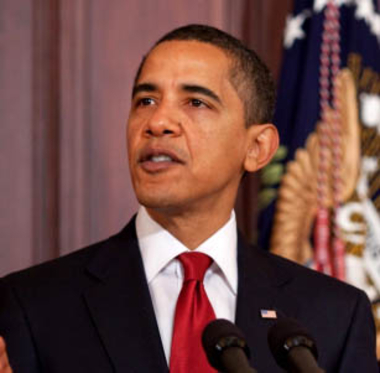Obama embodies King's dream and his struggle

SUZANNE GAMBOA, Associated Press
WASHINGTON (AP) — President Barack Obama is leading the civil rights pioneers of today and two of his predecessors in a celebrative but solemn commemoration of Dr. Martin Luther King's "I Have a Dream" speech of yesteryear, saluting his fight for equal opportunity.
Large crowds thronged to the National Mall and the Lincoln Memorial where King, with a soaring, rhythmic oratory and a steely countenance, pleaded with Americans to come together to stomp out racism and create a land of opportunity for all.
Slaty gray skies and a light drizzle greeted the earliest arrivals for an observance that seemed likely to take on a more formal, serious tone, than a commemorative rally last Saturday. People eager to get a close-up view of Obama and former Presidents Jimmy Carter and Bill Clinton clustered at a security checkpoint. And National Guard troops were arrayed along fence lines encircling the Mall from the World War II Memorial to the Lincoln Memorial.
The scheduled appearance later Wednesday of Obama, the first African-American president, was certain to embody the fulfilled dreams of hundreds of thousands who rallied there in 1963. Obama has not often talked publicly about racial issues in the time he has been president. He did, however, talk at some length about the challenges he faced as a young black male as he discussed the case of Trayvon Martin, the Florida teen-ager killed in a confrontation with neighborhood watch volunteer George Zimmerman.
When Obama took office in January 2009, he had broken through barriers that many before him could only approach. But his presidency has been marred by racist backlash and his administration has found itself still taking on battles thought won, such as ensuring equal access to the voting booth.
Obama's speech was set to follow an organized ringing of church bells at mid-afternoon, about the same time of day that King, his jaw squared and his turning, delivered his clarion call for equal rights. Obama was being joined at the steps of the Lincoln Memorial by Carter and Clinton. Other luminaries include Lynda Bird Johnson Robb, daughter of President Lyndon Johnson, who signed the 1964 Civil Rights Act and the 1965 Voting Rights Act, and Rep. John Lewis, D-Ga., a longtime leader in the civil rights battles.
Preceding the speeches, a march was organized featuring a replica of a transit bus that civil rights leader Rosa Parks rode when she refused to give up her seat to a white man in 1955, and an interfaith service also was held. Tens of thousands had flocked to the Mall for Saturday's celebration.
Obama considers the 1963 march a "seminal event" and part of his generation's "formative memory." A half-century after the march, he said, is a good time to reflect on how far the country has come and how far it still has to go.
In an interview Tuesday on Tom Joyner's radio show, Obama said he imagines that King "would be amazed in many ways about the progress that we've made." He listed advances such as equal rights before the law, an accessible judicial system, thousands of African-American elected officials, African-American CEOs and the doors that the civil rights movement opened for Latinos, women and gays.
"I think he would say it was a glorious thing," he said.
But Obama noted that King's speech was also about jobs and justice.
"When it comes to the economy, when it comes to inequality, when it comes to wealth, when it comes to the challenges that inner cities experience, he would say that we have not made as much progress as the civil and social progress that we've made, and that it's not enough just to have a black president, it's not enough just to have a black syndicated radio show host," the president said.
___
Associated Press writer Darlene Superville contributed to this report.
___
Follow Suzanne Gamboa on Twitter at http://www.twitter.com/APsgamboa
Copyright 2013 The Associated Press. All rights reserved. This material may not be published, broadcast, rewritten or redistributed.
August 28, 2013





